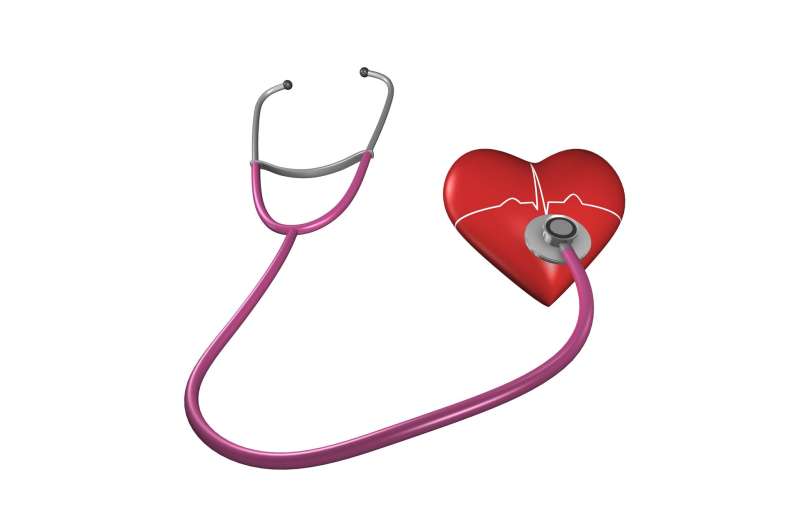Having high cholesterol levels early in life leads to heart problems by middle age

Having elevated cholesterol during the teens or early twenties increases a person's risk of having a heart attack, stroke or other cardiovascular event during middle age. That is the finding a new landmark study led by researchers at the University of Maryland School of Medicine (UMSOM). This increased risk persists even in those who were able to get their cholesterol levels down to a healthy level before reaching their late thirties. The research makes a strong case for doctors to intervene early to treat high levels of low-density lipoprotein (LDL), the so-called "bad" type of cholesterol, the study authors contend. It also provides guidance for future intervention studies aimed at stemming the worldwide epidemic of heart disease and stroke.
The study, entitled "Time Course of LDL Cholesterol Exposure and Cardiovascular Disease Event Risk", was published today in the Journal of the American College of Cardiology and relied on data from the Coronary Artery Risk Development in Young Adults Study (CARDIA). This ongoing study, funded by the National Heart, Lung, and Blood Institute, began 35 years ago, recruiting 5,000 young adults aged 18 to 30. It has been tracking this cohort ever since to understand how individual characteristics, lifestyle and environmental factors contribute to the development of cardiovascular disease later in life.
"We found having an elevated LDL cholesterol level at a young age raises the risk of developing heart disease, and the elevated risk persists even in those who were able to later lower their LDL cholesterol levels" said study leader Michael Domanski, MD, a Professor of Medicine at UMSOM. For instance, two people with the same cholesterol level at age 40 may have very different risks of having a heart attack or stroke with risk being higher for the person who had higher cholesterol as a teenager.
"Damage to the arteries done early in life may be irreversible and appears to be cumulative," Dr. Domanski said. "For this reason, doctors may want to consider prescribing lifestyle changes and also medications to lower high LDL cholesterol levels in young adults in order to prevent problems further down the road."
To conduct the study, the researchers used complex mathematical modeling to understand how cardiovascular risk (heart attack, stroke, blood vessel blockages, and death from cardiovascular disease) rises with increasing cumulative "exposure" to LDL cholesterol over an average of 22 years. They found that the greater the area under the "LDL curve"—which measured time of exposure and level of LDL cholesterol over time—the more likely participants were to experience a major cardiovascular event.
"Interestingly and importantly, we also found it was not just the area under the curve that accounted for the difference in risk but also the time course of the exposure," study co-author Charles Hong, MD, Ph.D., the Melvin Sharoky, MD, Professor in Medicine at UMSOM. "This underscores the importance of regular cholesterol screenings beginning in early adulthood to help reduce this time of high exposure."
While the medical establishment understands the importance of managing high LDL cholesterol levels to lower heart risks, there is little consensus on how aggressively to intervene in young adults who may not experience a heart attack or stroke for decades. The American College of Cardiology's current cholesterol management guidelines recommend using lifestyle measures to lower high LDL levels during the teenage years. This includes exercise, maintaining a healthy body mass index, and following a healthy diet low in saturated animal fats. The guidelines recommend that doctors consider prescribing cholesterol-lowering medications like statins to prevent heart disease in those ages 20 to 39 who have elevated cholesterol levels, especially if they have a family history of early-onset heart disease.
Researchers from the National Heart, Lung, and Blood Institute, George Washington University, Northwestern Feinberg School of Medicine, University of Alabama School of Medicine, the University of Toronto and the Icahn School of Medicine at Mount Sinai were co-authors on this study.
"Cardiovascular disease remains the biggest killer in the world, and this new finding provides a potential way to save many lives," said E. Albert Reece, MD, Ph.D., MBA, Executive Vice President for Medical Affairs, UM Baltimore, and the John Z. and Akiko K. Bowers Distinguished Professor and Dean, University of Maryland School of Medicine. "The medical community should sit up, take notice, and respond to this important new evidence."
More information: Michael J. Domanski et al, Time Course of LDL Cholesterol Exposure and Cardiovascular Disease Event Risk, Journal of the American College of Cardiology (2020). DOI: 10.1016/j.jacc.2020.07.059




















